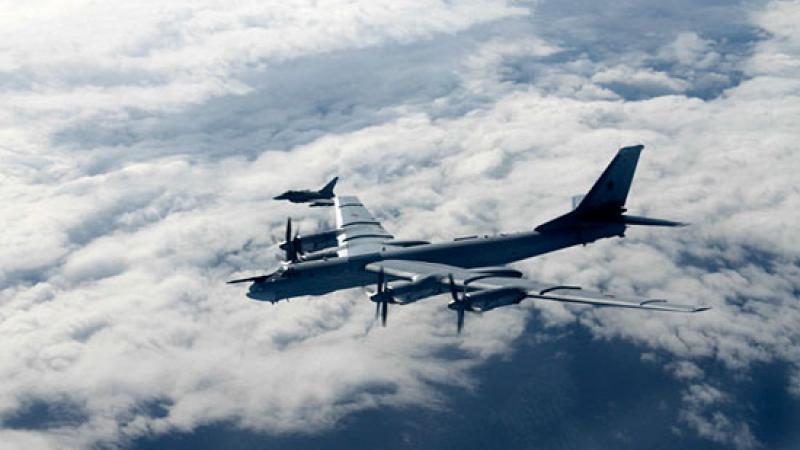Amid Ukraine crisis, Biden partnering with Russia to revive Iran deal, thwart US opponents: experts
Administration has held secret talks with Russians to preempt future Trump-like exit from accord, experts and former officials warn.
As President Biden condemns Russia's invasion of Ukraine and publicly threatens Moscow with escalating punitive measures, his administration is quietly collaborating with the Russians to revive the Iran nuclear deal and undermine future U.S. presidents who might withdraw from it, according to experts and former U.S. officials.
"The U.S. has partnered with Russia to get a new nuclear deal with Iran," said Fred Fleitz, a former CIA analyst who also served as a senior staffer on both the House Intelligence Committee and the National Security Council. "This includes secret talks with the Russians over the last year and agreements where Russia would hold uranium enriched by Iran and give it back to Iran if a future Republican president backed out of a new nuclear deal."
Former President Trump withdrew from the Iran nuclear deal in 2018. The agreement, which placed temporary restrictions on Iran's nuclear program in exchange for lifting sanctions on Iran, was struck in 2015 and implemented in 2016. Many experts and U.S. officials believe Iran seeks to build nuclear weapons — a charge Tehran denies.
"The Biden administration has been working with Russia to get it to undermine a future Republican president by helping Iran's nuclear program," added Fleitz.
Richard Goldberg, who served on the National Security Council and worked as a staffer in Congress for years, noted that under the deal being negotiated "it appears Iran would send enriched uranium stockpiles to Russia on condition Russia would return the stockpile if the U.S. reimposes terrorism sanctions."
Earlier this year, the Biden administration said it was "aware" of a Russian proposal for an interim nuclear deal with Iran without sharing details, causing House Republicans to demand the administration share what it knows.
"Russia sent a secret agreement to Iran," Rep. Michael McCaul (R-Texas) said at the time. "Russia is trying to take the lead now in the negotiations with Iran. This is a secret agreement. We haven't seen it."
The U.S. and Iran have been negotiating indirectly in Vienna over the nuclear deal, allowing Russia to play an influential role with both sides directly.
Gabriel Noronha, who served in the Trump administration as a special adviser for Iran at the State Department, tweeted Wednesday that his former career colleagues from the State Department, National Security Council, and European Union are so concerned about the deal taking shape in negotiations in Vienna that they shared with him details to publicize in hopes that Congress will intervene.
"The entire negotiations have been filtered and 'essentially run' by Russian diplomat Mikhail Ulyanov," one of the officials said, according to Noronha.
Biden's negotiating team in Vienna is led by Robert Malley, who, according to Noronha, has proposed that the U.S. will remove Iran's Islamic Revolutionary Guard Corps (IRGC) from the Foreign Terrorist Organization list and lift sanctions on it if the Iranians "simply promise to talk to the United States in new negotiations about their 'regional activity' (aka terrorism)."
Biden's team is also reportedly preparing to lift sanctions imposed by the Trump administration on the office of Iran's supreme leader and those associated with it.
These actions would fit with a report written by the Iranian Foreign Ministry for Iran's parliament last summer.
In that report, Iranian officials wrote the Biden administration was prepared to lift not only sanctions waived by the nuclear deal but also the additional penalties imposed by the Trump administration. Among them would be sanctions against Iranian Supreme Leader Ali Khamenei and the U.S. designation of the IRGC as a terrorist organization.
In other words, it appears the Biden administration isn't simply trying to revive the original Iran nuclear deal; instead, it's negotiating one that, experts warn, will be more advantageous to Iran.
The U.S. would "pay more up front with less time on the clock and less lengthy restrictions on Iran's nuclear program," said Behnam Ben Taleblu, a senior fellow at the Foundation for Defense of Democracies.
Some of the deal's key restrictions on Iran's nuclear program expire within the next decade.
Taleblu explained the regime is trying to build "financial armor" to prepare for the event of the U.S. withdrawing from the deal after the 2024 election if a new U.S. president wishes to do so.
"Iran had a crash course in surviving maximum pressure" during the Trump administration, "learned lessons from it, and is trying to financially insulate itself as much as possible while retaining as much of its nuclear program as possible," he said.
Russia doesn't want a nuclear-armed Iran, experts explained, but the Kremlin does want a client-like state to its south — and the nuclear deal helps make that happen.
Experts and former officials told Just the News that when sanctions were first lifted under the nuclear deal in 2015-2016, Iran's repression increased at home while its aggression increased abroad as the regime allocated much of the money to its military and the IRGC.
"The Revolutionary Guards dominates the civilian economy," said Dr. Michael Rubin, a former Pentagon official and currently a senior fellow at the American Enterprise Institute. "They monopolize the oil industry, manufacturing, and construction. By unfreezing assets, lifting sanctions, and encouraging new investment, the Guards can expect a windfall, most of which they will use to finance their ideological projects at home and abroad. Expect terror attacks and insurgency to increase sharply."
Rubin also expressed concern about the Biden administration's collaboration with Russia to secure a nuclear deal with Iran.
"It shows a tremendous lack of judgment and strategic seriousness," he said. "If Iran is serious about a deal, they can talk to the Americans directly, and if they will not, then let them languish under sanctions."
"But to put our strategic interests and those of our allies in the hands of Russian negotiators is beyond belief," Rubin added. "We're not talking Manchurian Candidate; we're in Manchurian Administration territory."
Rubin isn't alone.
"To think [Russian President Vladimir] Putin would be an honest broker would be a strategic mistake," said Taleblu, who argued Russia has used its influence in nuclear negotiations with Iran as leverage against the U.S. and its allies, which have said publicly they want to revive the nuclear deal.
"The Russians have used the Iranians as a pawn in their game of competition with the West," he said. "Russia may seek to use elements of the deal in a future scenario in which the U.S. would try to leave the agreement as a weapon against another maximum pressure campaign."
Biden on Tuesday night curiously omitted Iran from his State of the Union address altogether, despite the fact that a revival of the Iran nuclear deal — one of Biden's most coveted goals — looks to be close.
Just the News reached out to the White House and the National Security Council with multiple questions on the Iran nuclear negotiations, including whether there's any connection to Russia. A spokesperson said they didn't have any comment beyond remarks by Deputy Principal Press Secretary Karine Jean-Pierre on Wednesday to reporters.
"At this final stage [of negotiations], all participants are working to clarify their positions on the most difficult issues," she said. "I'm not going to go into any specifics on the positions of Iran or the United States ... I would refer you to the State Department."
Just the News reached out to the State Department with the same questions but has yet to receive a response.
The Biden administration should be aware, experts warned, that Iran isn't just focused on securing sanctions relief.
For the regime, said Taleblu, "it's not just about short term financial gain; they are gunning for medium-term check mate."













